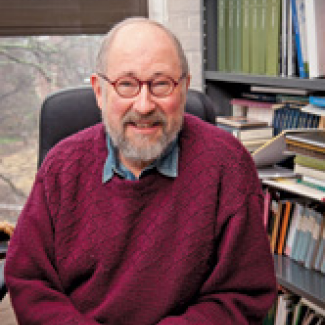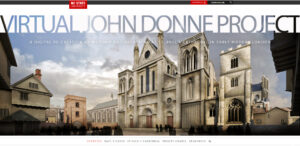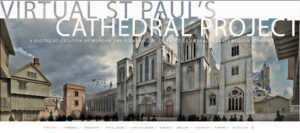John Wall

Bio
Dr. John N. Wall is Professor Emeritus of sixteenth and seventeenth century English literature, having served as a member of NC State’s Department of English from 1973 to 2023. His special interests include the poetry and prose of the early modern period, especially the works of Spenser, Donne, Herbert, and Shakespeare. Dr. Wall is particularly interested in the literature of the English Reformation. He is engaged in a long-term digital humanities project to recreate the experience of worship and preaching at St Paul’s Cathedral in London in the early seventeenth century.
In addition to his scholarly research and teaching responsibilities in the field of early modern English literature, Dr. Wall has served the university by chairing its Reaccreditation Self-Study in the 1990s and by co-chairing the faculty committee that successfully petitioned the national Phi Beta Kappa organization to grant NC State the right to host a Chapter of Phi Beta Kappa. Dr. Wall also served as Founding Director of the University Honors Program in the early 2000’s.
Dr. Wall has twice been a Fellow of the National Humanities Center and on numerous occasions served as Visiting Scholar of the Folger Institute at the Folger Shakespeare Library in Washington, DC. In the early 2000’s he was a Visiting Fellow at Wolfson College of Cambridge University in the UK. He has has also received multiple grants from the National Endowment for the Humanities.
Dr. Wall was awarded the Holladay Medal for Excellence in 2003. He was awarded the degree of Doctor of Divinity (honoris causa), by Virginia Episcopal Theological Seminary in 2018 and elected a Fellow of the Royal Historical Society in 2022.
Projects
Dr Wall’s major research is an ongoing multi-faceted digital humanities project entitled the Virtual John Donne Project. This project to date includes three components, the Virtual St Paul’s Cathedral Project, funded by a grant from the National Endowment for the Humanities, which uses visual and acoustic modeling technology to enable us to experience worship and preaching at St Paul’s Cathedral as events that unfold over time and on particular occasions in London in the early seventeenth century.

The Cathedral Project‘s website hosts a visual model of St Paul’s Cathedral and the surrounding churchyard, together with a recreation of worship for Easter Sunday 1624, with all the liturgical events of the day, including choir and organ music plus a sermon in the morning by Bishop Lancelot Andrewes and a sermon in the afternoon by John Donne, Dean of the cathedral.

Also included are the Virtual Paul’s Cross Project and the Virtual Trinity Chapel Project. The Paul’s Cross Project provides the experience of hearing John Donne’s sermon for Gunpowder Day, November 5th, 1622 in Paul’s Churchyard, the specific physical location for which it was composed. The Virtual Trinity Chapel Project recreates the script for a worship service conducted by George Montaigne, Bishop of London, to consecrate Trinity Chapel, a newly-constructed worship space on the campus of London’s Lincoln’s Inn.
Research Publications
Dr Wall has published five major books including an edition of the 17th century poet George Herbert’s English works and a scholarly study of the religious poetry of Edmund Spenser, George Herbert, and Henry Vaughan entitled Transformations of the Word.
He has also published over 40 scholarly articles, including the following:
- “Virtual Paul’s Cross: The Experience of Public Preaching after the Reformation,” in Paul’s Cross and the Culture of Persuasion in England, 1520–1640, ed. Torrance Kirby and P.G. Stanwood (Leiden: E. J. Brill, 2014), pp. 61 – 92.
- “Recovering Lost Acoustic Spaces: St. Paul’s Cathedral and Paul’s Churchyard in 1622.” In Digital Studies/Le Champ Numérique. (http://www.digitalstudies.org/ojs/index.php/digital_studies/article/view/251/310)
- “Transforming the Object of our Study: The Early Modern Sermon and the Virtual Paul’s Cross Project,” in the Spring 2014 issue of the Journal of Digital Humanities (http://journalofdigitalhumanities.org/3-1/transforming-the-object-of-our-study-by-john-n-wall/).
- “Worship at Trinity Chapel, Lincoln’s Inn, London, 22 May 1623.” Anglican and Episcopal History (2012) 81: 113 – 212.
- “The Irregular Ordination of John Donne.” John Donne Journal 27 (2008), 81-102.
- “John Donne and the Practice of Priesthood.” Renaissance Papers 2007 (2008), 1-16.
- “Situating Donne’s Dedication Sermon at Lincoln’s Inn, 22 May 1623.” JDJ 26 (2007), 159-239.
- “That Holy Roome”: John Donne and the Conduct of Worship at St. Paul’s.” RP (2006), 61-84.
- “Crashaw, Catholicism, and Englishness: Defining Religious Identity.” RP (2005), 107-126.
- “John Donne Practices Law: The Case of the Brentwood School.” JDJ 23 (2005), 257-297.
Presentations
Dr Wall has also delivered over 40 scholarly papers at meetings of learned societies, including the following:
“Donne Preaching in Place: The Paul’s Cross Sermon and the Acoustics of Paul’s Churchyard,” as part of the conference Place and Preaching, St Paul’s Cathedral, London, September 6-7, 2013
“Virtual Medieval St Paul’s Cathedral” at a session of the Digital Humanities Seminar of the Institute of Historical Research at the University of London, February 18, 2014
“Reconstructing Pre-Modern Spaces,” at the symposium Reconceiving Pre-Modern Spaces, sponsored by the MARCO Institute at the University of Tennessee, in Knoxville, March 8, 2014
“John Donne as Absentee Rector: New Light from the Archives” at the annual meeting of the Renaissance Society of America in New York City, March 29th, 2014.
Education
Ph.D English Literature Harvard University 1973
M.Div. Church History Episcopal Theological School 1972
M.A. English Literature Duke University 1969
B.A. English Literature University of North Carolina at Chapel Hill 1967
Area(s) of Expertise
Dr. Wall's fields of inquiry in his research and scholarship include early modern English literature, religion and literature, and the digital humanities.
Honors and Awards
- Elected Fellow, Royal Historical Society, London (2022)
- Awarded Doctor of Divinity (honoris causa), by Virginia Episcopal Theological Seminary, May 17, 2018
- Awarded Alexander Quarles Holladay Medal for Excellence, by the NC State University Board of Trustees, 2003
- Elected Life Member, Friends of the Library, NC State University, 1996
- Elected Member of Phi Kappa Phi, NC State University, 1993
- Elected Member of Phi Beta Kappa, UNC-Chapel Hill, 1966